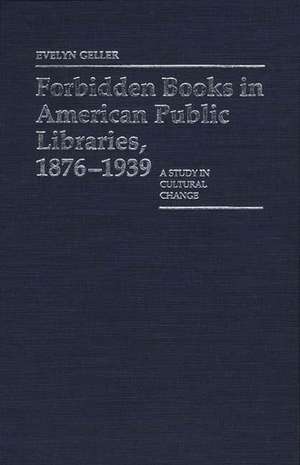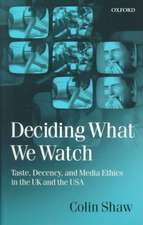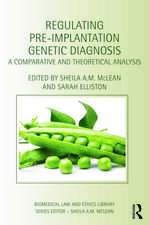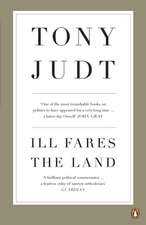Forbidden Books in American Public Libraries, 1876-1939: A Study in Cultural Change: Contributions in Librarianship and Information Science,, cartea 46
Autor Evelyn Gelleren Limba Engleză Hardback – 31 mar 1984
This study traces the way in which the librarian as the guardian of the freedom to read came to replace the librarian as moral censor. This shift in ideology is traced against a backdrop of major social and literary changes. Within this context, censorship is treated as part of a broader professional ideology of book selection. Geller treats that ideology in terms of three constant dilemmas of choice: populism vs. elitism, neutrality vs. advocacy, and freedom vs. censorship. By exploring the ways in which librarians as public servants have defined their selection policies in terms of the public interest, she sheds new light on the complex historical background and shifting social values that underlie contemporary policy alternatives.
Din seria Contributions in Librarianship and Information Science,
- 51%
 Preț: 252.39 lei
Preț: 252.39 lei - 55%
 Preț: 149.99 lei
Preț: 149.99 lei - 36%
 Preț: 465.19 lei
Preț: 465.19 lei - 43%
 Preț: 295.37 lei
Preț: 295.37 lei - 31%
 Preț: 283.56 lei
Preț: 283.56 lei - 28%
 Preț: 461.00 lei
Preț: 461.00 lei - 27%
 Preț: 439.60 lei
Preț: 439.60 lei - 38%
 Preț: 344.82 lei
Preț: 344.82 lei - 47%
 Preț: 151.04 lei
Preț: 151.04 lei - 42%
 Preț: 271.22 lei
Preț: 271.22 lei - 38%
 Preț: 345.74 lei
Preț: 345.74 lei - 38%
 Preț: 345.49 lei
Preț: 345.49 lei - 38%
 Preț: 436.57 lei
Preț: 436.57 lei - 24%
 Preț: 362.02 lei
Preț: 362.02 lei - 38%
 Preț: 442.56 lei
Preț: 442.56 lei - 45%
 Preț: 385.61 lei
Preț: 385.61 lei - 28%
 Preț: 438.00 lei
Preț: 438.00 lei - 34%
 Preț: 207.28 lei
Preț: 207.28 lei - 42%
 Preț: 422.44 lei
Preț: 422.44 lei - 51%
 Preț: 254.18 lei
Preț: 254.18 lei - 34%
 Preț: 559.72 lei
Preț: 559.72 lei - 33%
 Preț: 319.83 lei
Preț: 319.83 lei - 28%
 Preț: 344.47 lei
Preț: 344.47 lei - 24%
 Preț: 461.35 lei
Preț: 461.35 lei - 40%
 Preț: 509.02 lei
Preț: 509.02 lei - 27%
 Preț: 439.51 lei
Preț: 439.51 lei - 41%
 Preț: 312.84 lei
Preț: 312.84 lei - 33%
 Preț: 320.87 lei
Preț: 320.87 lei
Preț: 322.40 lei
Preț vechi: 481.91 lei
-33% Nou
61.70€ • 64.33$ • 51.28£
Carte tipărită la comandă
Livrare economică 21 martie-04 aprilie
Specificații
ISBN-10: 0313238081
Pagini: 234
Dimensiuni: 156 x 234 x 16 mm
Greutate: 0.54 kg
Editura: Greenwood Press
Seria Contributions in Librarianship and Information Science,













